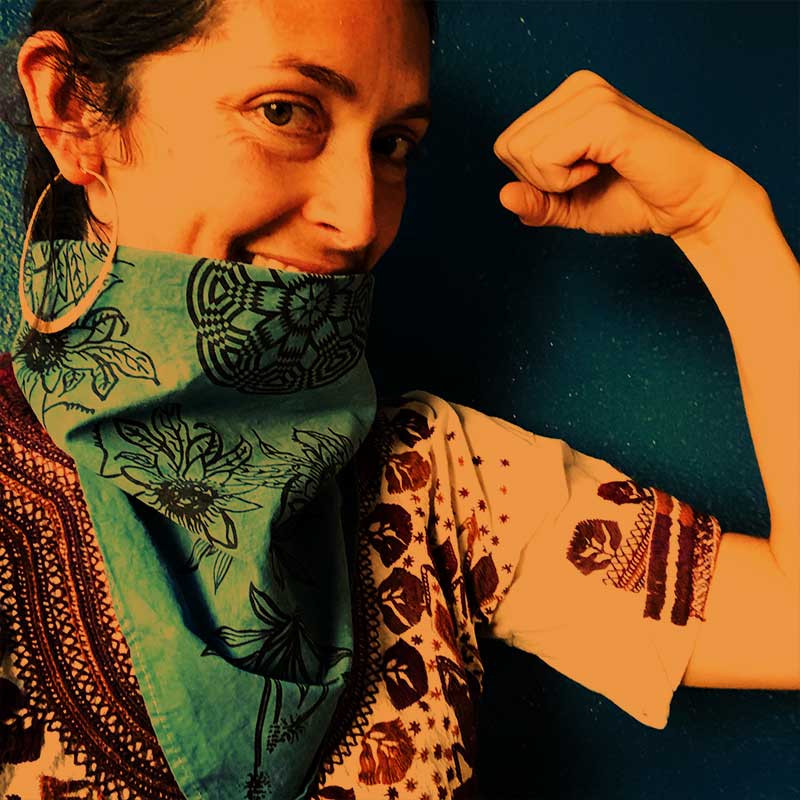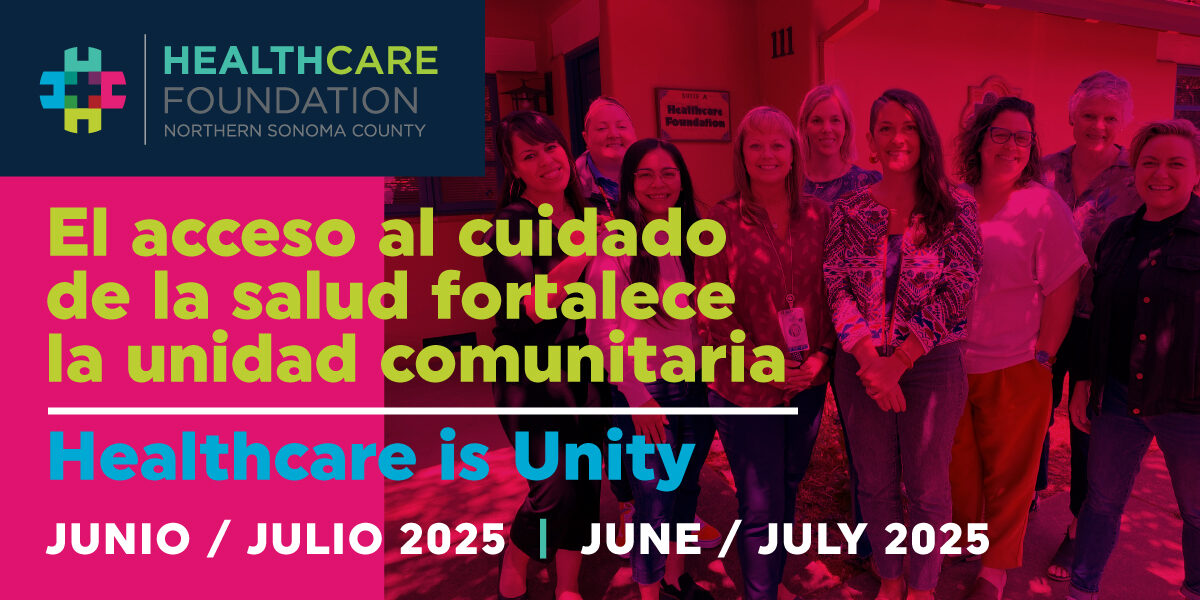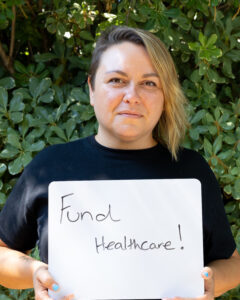

Local Perspectives on Improving Health and Wellbeing for Farmworker Families in Northern Sonoma County: Jocelyn Boreta
2 min read. Jocelyn Boreta, Executive Director of The Botanical Bus, is pictured here working with her child.

Jocelyn Boreta is executive director and co-founder of the Botanical Bus, a bilingual mobile herb clinic that empowers holistic health by-and-for Latinx and Indigenous people. Botanical Bus is composed of health equity activists, Promotora Community Health Workers and integrative health practitioners committed to anti-racist, trauma-informed care. Embodying the proven success of the self-healing community model in which holistic health is empowered by the people, for the people, the Botanical Bus meets Latine and Indigenous clients where they are—at vineyard worksites and trusted family service centers—to provide bilingual, bicultural health services including massage, acupuncture, somatic therapy, diabetes prevention and care, clinical nutrition and herbalism. Programs, led by Promotora Community Health Workers, include Farmworkers Clinics and Wellness Workshops.
How would you describe the general situation with respect to health and wellbeing for farmworker families in northern Sonoma County?
Farmworker families in northern Sonoma County experience staggering health disparities shaped and sustained by current social and economic inequities. In 2022, at the Botanical Bus Farmworker Clinic, 69% of Botanical Bus clients strongly agreed that their everyday activities are limited by nervousness, hopelessness or sadness; and 60% strongly agreed that their everyday activities are limited by physical pain. In a limited survey of 35 clients at a recent Farmworker Clinic event, 40% of clients reported being without health insurance, and 19% reported low levels of comfort accessing care at regional federally qualified health centers.
What are the biggest challenges or obstacles to accessing healthcare for farmworkers?
In our work providing mobile, culturally centered health care to farmworker communities, we witness driving distance, hours of employment, language, technology and trust to be significant barriers to accessing regional health homes.
What, in your opinion, are the solutions and/or some practical steps in the direction of bettering access and improving opportunities for health and wellbeing for farmworkers and their families?
We believe that accessible healthcare for the farmworker community needs to be mobile, bilingual and bicultural. The Botanical Bus health services are mobile because residential segregation, by race and ethnicity, income and occupation, is a social determinant of health. Our health services are bilingual because 4 in 10 of the 29,000 undocumented immigrants residing in Sonoma County do not speak English (Lewis, Kristen, A Portrait of Sonoma County: 2021 Update, New York: Measure of America, Social Science Research Council, 2021). Our health services are bicultural because positive mental health outcomes can be better achieved through valuing cultural wealth (Adames & Chavez-Dueñas, Cultural Foundations and Interventions in Latino/a Mental Health (1st ed.), New York: Routledge, 2016).
Our Farmworker Clinic program is founded and led by Latine and Indigenous Promotora Community Health Workers (CHWs), many of whom identify as Campesinas [Farmworkers] themselves. Based on the proven success of the self-healing community model, Promotora CHWs are uniquely qualified to provide culturally centered care in their own communities.
“Farmworker families in northern Sonoma County experience staggering health disparities shaped and sustained by current social and economic inequities. In 2022, 69% of Botanical Bus clients strongly agreed that their everyday activities are limited by nervousness, hopelessness or sadness; and 60% strongly agreed that their everyday activities are limited by physical pain.”
Jocelyn Boreta, Executive Director and Co-Founder, The Botanical Bus
Recent evidence-based research supports the recommendation that “Native/Indigenous culture (i.e., cultural connectedness) be considered an important intervention objective and health-related outcome measure” (Masotti et al., BMC Public Health 23: 741, 2023). Our culturally centered programs meet our clients in their strength of knowledge and tradition. We recognize herbalism and nutrition as foundational to self-care and community-care practices in the Latine and Indigenous community. We weave culture into every process with clients welcomed with music, agua frescas and traditional foods; clinical intake guided by an opening blessing circle; and exit surveys accompanied by a tamale meal. Direct services include massage, acupuncture, somatic therapy, tapping, physical therapy for repetitive use injury, clinical nutrition and herbalism.
All of our outreach, forms, programming and services are provided in Spanish. We also take into consideration other factors such as literacy levels, limitations using technology, and levels of trust accessing care. Clinic registration through online forms is accompanied by text message outreach and phone-call follow up. Intake, exit surveys, and referrals are completed with in-person support provided by bilingual, bicultural CHWs and prioritization of cultural connectedness.
Is there anything you think the wider community (including nonprofits) of northern Sonoma County should know that might help to move things in the right direction?
I believe that multisector advocacy that builds relationships with vineyard management can be used to make connections, elevate farmworkers’ voices, and ultimately establish pathways into providing mobile, bilingual, bicultural healthcare at vineyard worksites.
The Healthcare Foundation’s mission is motivated by a vision of eliminating health inequities in northern Sonoma County. In recent months and years, Sonoma County farmworkers and their families have faced increased precarity and the repeated disruption of their lives as a result of forces beyond their control, from the pandemic to the impacts of climate change, with the attendant physical and mental health impacts and challenges this entails. The goal of health equity requires that we address the obstacles and challenges to their health and wellbeing. As part of the Healthcare Foundation’s effort to focus on farmworker health, we are turning to our community partners and other local stakeholders to better understand the need, the obstacles, and most importantly, the practical steps that can be taken to improve health and wellbeing for our region’s agricultural workers. We continue to collect information, engage in dialogue, and work cooperatively toward community-based solutions that can protect and enhance the wellbeing of farmworkers and their families.
Other Perspectives:
- Dr. Daniela Domínguez, Assistant Professor at USF and CEO of On The Margins (2 min read)
- Sue Labbe, Chief Executive Officer of Alliance Medical Center (2 min read)
- Corazón Healdsburg’s Promotora Staff (2 min read)
- Jade Weymouth, Executive Director of La Familia Sana (2 min read)
- Bertha Diaz, Community Health Worker / Promotora and Financial Services Specialist at Alexander Valley Healthcare (1 min read)
- Alma Bowen, Founder and Executive Director of Nuestra Comunidad (1 min read)

Related News + Stories
Invest in Our Community
Your support is vital to our collective vision of eliminating health inequities in northern Sonoma County.
Donate



